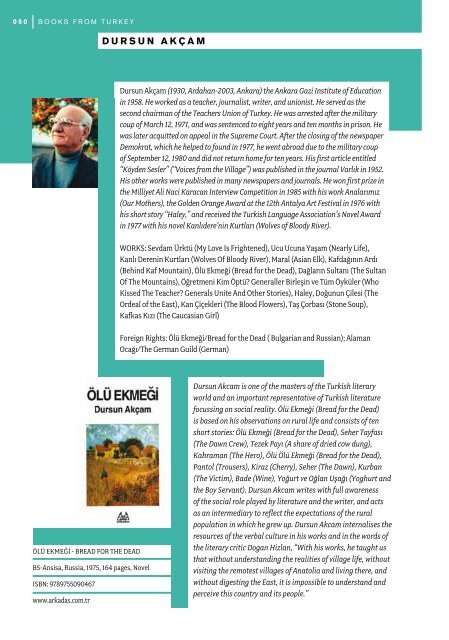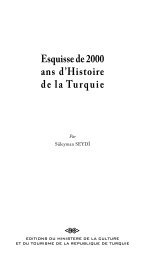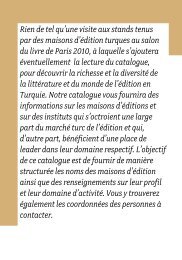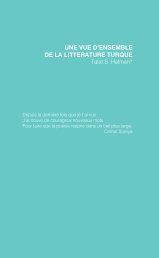The catalogue “Books from Turkey” consists of a collection of texts ...
The catalogue “Books from Turkey” consists of a collection of texts ...
The catalogue “Books from Turkey” consists of a collection of texts ...
Create successful ePaper yourself
Turn your PDF publications into a flip-book with our unique Google optimized e-Paper software.
0 5 0<br />
B O O K S F R O M T U R K E Y<br />
ÖLÜ EKMEĞİ - BREAD FOR THE DEAD<br />
BS-Ansisa, Russia, 1975, 164 pages, Novel<br />
ISBN: 9789755090467<br />
www.arkadas.com.tr<br />
D U R S U N A K Ç A M<br />
Dursun Akçam (1930, Ardahan-2003, Ankara) the Ankara Gazi Institute <strong>of</strong> Education<br />
in 1958. He worked as a teacher, journalist, writer, and unionist. He served as the<br />
second chairman <strong>of</strong> the Teachers Union <strong>of</strong> Turkey. He was arrested after the military<br />
coup <strong>of</strong> March 12, 1971, and was sentenced to eight years and ten months in prison. He<br />
was later acquitted on appeal in the Supreme Court. After the closing <strong>of</strong> the newspaper<br />
Demokrat, which he helped to found in 1977, he went abroad due to the military coup<br />
<strong>of</strong> September 12, 1980 and did not return home for ten years. His first article entitled<br />
“Köyden Sesler” (“Voices <strong>from</strong> the Village”) was published in the journal Varlık in 1952.<br />
His other works were published in many newspapers and journals. He won first prize in<br />
the Milliyet Ali Naci Karacan Interview Competition in 1985 with his work Analarımız<br />
(Our Mothers), the Golden Orange Award at the 12th Antalya Art Festival in 1976 with<br />
his short story “Haley,” and received the Turkish Language Association’s Novel Award<br />
in 1977 with his novel Kanlıdere’nin Kurtları (Wolves <strong>of</strong> Bloody River).<br />
WORKS: Sevdam Ürktü (My Love Is Frightened), Ucu Ucuna Yaşam (Nearly Life),<br />
Kanlı Derenin Kurtları (Wolves Of Bloody River), Maral (Asian Elk), Kafdağının Ardı<br />
(Behind Kaf Mountain), Ölü Ekmeği (Bread for the Dead), Dağların Sultanı (<strong>The</strong> Sultan<br />
Of <strong>The</strong> Mountains), Öğretmeni Kim Öptü? Generaller Birleşin ve Tüm Öyküler (Who<br />
Kissed <strong>The</strong> Teacher? Generals Unite And Other Stories), Haley, Doğunun Çilesi (<strong>The</strong><br />
Ordeal <strong>of</strong> the East), Kan Çiçekleri (<strong>The</strong> Blood Flowers), Taş Çorbası (Stone Soup),<br />
Kafkas Kızı (<strong>The</strong> Caucasian Girl)<br />
Foreign Rights: Ölü Ekmeği/Bread for the Dead ( Bulgarian and Russian); Alaman<br />
Ocağı/<strong>The</strong> German Guild (German)<br />
Dursun Akcam is one <strong>of</strong> the masters <strong>of</strong> the Turkish literary<br />
world and an important representative <strong>of</strong> Turkish literature<br />
focussing on social reality. Ölü Ekmeği (Bread for the Dead)<br />
is based on his observations on rural life and <strong>consists</strong> <strong>of</strong> ten<br />
short stories: Ölü Ekmeği (Bread for the Dead), Seher Tayfası<br />
(<strong>The</strong> Dawn Crew), Tezek Payı (A share <strong>of</strong> dried cow dung),<br />
Kahraman (<strong>The</strong> Hero), Ölü Ölü Ekmeği (Bread for the Dead),<br />
Pantol (Trousers), Kiraz (Cherry), Seher (<strong>The</strong> Dawn), Kurban<br />
(<strong>The</strong> Victim), Bade (Wine), Yoğurt ve Oğlan Uşağı (Yoghurt and<br />
the Boy Servant). Dursun Akcam writes with full awareness<br />
<strong>of</strong> the social role played by literature and the writer, and acts<br />
as an intermediary to reflect the expectations <strong>of</strong> the rural<br />
population in which he grew up. Dursun Akcam internalises the<br />
resources <strong>of</strong> the verbal culture in his works and in the words <strong>of</strong><br />
the literary critic Dogan Hizlan, “With his works, he taught us<br />
that without understanding the realities <strong>of</strong> village life, without<br />
visiting the remotest villages <strong>of</strong> Anatolia and living there, and<br />
without digesting the East, it is impossible to understand and<br />
perceive this country and its people.”






